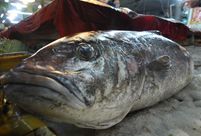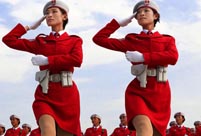 Bikini show in 2014 China Final of Miss Tourism World
Bikini show in 2014 China Final of Miss Tourism World
 Close-up view of August Aerobatic Team
Close-up view of August Aerobatic Team
 Goddesses married in 2014
Goddesses married in 2014
 Polar region photos raise worldwide awareness of global warming
Polar region photos raise worldwide awareness of global warming
 Get off at the last stop — Beijing Subway in vision
Get off at the last stop — Beijing Subway in vision
 Top 100 beauties in the world!
Top 100 beauties in the world!
 Gallery: Who is the most beautiful one?
Gallery: Who is the most beautiful one?
 If you like autumn, put your hands in the air!
If you like autumn, put your hands in the air!
 Fan Bingbing's "Queen style" in new play
Fan Bingbing's "Queen style" in new play
 Lingerie show at 2014 Miss China
Lingerie show at 2014 Miss China
With oil prices sinking and the ruble falling in value, Russia is experiencing the gravest economic crisis since the turn of the century. After its value crashed for two days running, the ruble has depreciated over 50 percent against the US dollar so far this year to become the worst performing global currency. At present, there seems to be no way to bail it out, and what will happen to the Russian economy is difficult to predict.
Some analysts are comparing Russia's current situation with the eve of the Soviet Union's dissolution, when oil prices were also at a low ebb. Some speculate that the deepening economic crisis will impose new challenges to Russian President Vladimir Putin's tenure, forcing him to apply a defensive strategy. But there are also some concerns about him becoming more aggressive.
This speculation raises a question: Is Russia's economy worse now than the time when the Soviet Union collapsed?
Compared with 23 years ago, Russia's manufacturing capacity and agricultural production have not greatly improved, and it's much diminished strength has not left much room to maneuver. What's more, Moscow now faces Western sanctions and there is deep antagonism between Moscow and Washington.
But Russian society is much more united than before. Putin retains high approval ratings among the Russian public, who learned heavy lessons after the collapse and harbor no delusions toward the West.
Russia's foreign exchange reserves still boast about $400 billion, which means, unlike immediately following the dissolution of the Soviet Union, the well-being of the Russian people will not be severely impacted in the short term. Although the threat of collapse is still far away, Russia will go through a long-running winter instead of a temporary storm.
China has become a significant factor that determines Russia's strategic environment. Seeking China's support is one of Russia's most realistic options.
While it might play a key role, China has to keep a clear mind when giving a helping hand to Russia. China-Russia cooperation is no longer ideology-based but driven by common interests. Although it has the capability to offer help to Russia at critical moments, China does not have to act in a proactive manner.
Any facilitation and aid must be given with the request of Moscow through the normal channels of country-to-country exchanges. This will reduce Moscow's misunderstandings to the minimum.
This crisis will probably urge Russia to recalibrate some of its national strategies. But it is by no means a fact that Russia will draw closer to China because of this. With many uncertainties, China also faces challenges about how to lead its relationship with Russia to a reciprocal end.
Russia is at a crossroads, and the direction it chooses will impact world politics. China's stance is clear, and it does not want Russia to collapse.
 Unknown 'monster' fish caught in Shandong
Unknown 'monster' fish caught in Shandong 20 years on: Relocated Three Gorges residents through lens
20 years on: Relocated Three Gorges residents through lens PLA HK Garrison veterans leave behind beautiful smiles
PLA HK Garrison veterans leave behind beautiful smiles Chestnut girl goes viral online
Chestnut girl goes viral online Beautiful Chinese woman
Beautiful Chinese woman Representative beauties
Representative beauties Victoria's Secret Fashion Show
Victoria's Secret Fashion Show Excellent photos of Zhuhai Air Show
Excellent photos of Zhuhai Air Show In photos: Bright and brave female soldier of PLA
In photos: Bright and brave female soldier of PLA A touch of salt
A touch of salt Open Internet not at odds with regulation
Open Internet not at odds with regulation Shanghai-HK stock plan adjusted
Shanghai-HK stock plan adjusted Experts, public torn on making APEC auto restrictions permanent
Experts, public torn on making APEC auto restrictions permanentDay|Week|Month